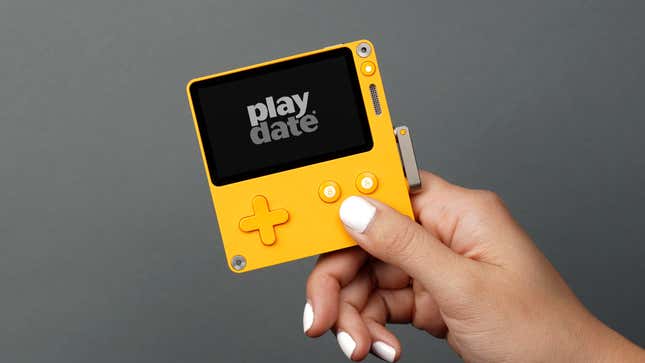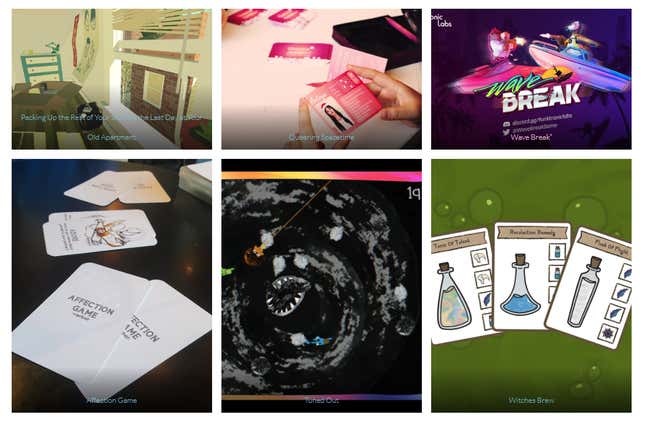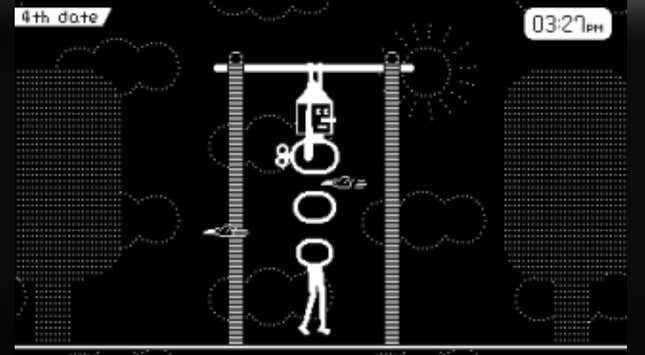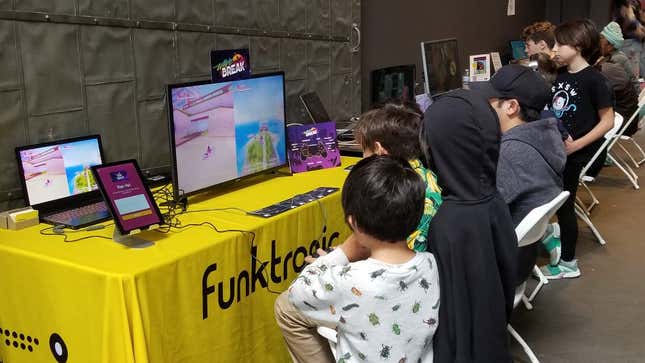
On May 22, app developer and game publisher Panic announced a new gaming handheld called Playdate that quickly became a mini-sensation online. Playdate is also the name used by a small, yearly indie showcase for experimental games, the 2019 edition of which took place just a few days later. The back-and-forth over the name “Playdate” has sparked an ongoing discussion about which parts of the indie game space get to be successful, and how those spoils are shared.
This week, one of the organizers of the Playdate event, Nathalie Lawhead, wrote a blog post criticizing Panic for, in her words, “basically telling us we can’t use the name anymore because it would be a shame if our event got confused with what they are doing.” After being contacted by Panic cofounder Cabel Sasser in 2018, the event organizers changed its name to “Playdate Pop Up” in January of this year. “I didn’t perceive [the email] as leaving us much of a choice,” Lawhead told Kotaku.
The first Playdate exhibition was held in 2016 as part of the larger LA Zine Fest, an event put on by the local non-profit Fulcrum Arts. One of the games featured that year was Envirogolf, a golf simulator that made the player contend with the nearby wildlife and while trying to make par. The event has returned every year since, including last weekend, but this time under the new name.

“We’ve been calling ourselves Playdate for years,” Lawhead wrote. “An event like Playdate (us, proper) is hardly a threat to Playdate (game-toy),” she wrote. “We are literally the culture that your advertising is supposedly touting (‘weird’, experimental). You come in, take these ideas, mentalities, philosophies, register it, own it, and bully the people that broke that ground for you.”
Lawhead’s post prompted Panic’s Sasser to respond on Twitter with a copy of his original email to the event organizers. In the email, dated May 29, 2018, Sasser wrote that Panic had been working on the Playdate hardware since 2014 and that the company had already registered the trademark for the name.
“When our dumb thing launches, I feel there’s a very real possibility people will start confusing your thing with our thing, and that will be really annoying for your thing,” the email read in part. “So ideally, I think it’d be best if your Playdate either tweaked [its] name (i.e. always ‘The Playdate Game Show’ or something more unique) or otherwise came up with a totally different and unique name. And if we decided that was a good solution, I would make sure we compensate you in some way for your time and the pain in the ass factor.”

As it turned out, the message that Panic intended to send and the message that the Playdate event organizers read were quite different. “My intention was always to find a way for our Playdates to co-exist joyfully,” Sasser wrote this week on Twitter. “I was worried we would overshadow yours. That sounded entitled—I’m sorry. I thought your idea to add ‘pop up’ was great, but we remain fine with you using the name Playdate. Please, keep using it.”
While Sasser’s response on Twitter helped put to bed the question of whether Panic would try to enforce its trademark against the Playdate event, Lawhead’s blog post and the remarks of her fellow event organizers have also prompted Panic to address ways that the popularity of Playdate the device can be shared with the larger experimental game development community.
Panic describes the Playdate, a miniature, lemon-yellow gaming device with a black and white screen and a hand-crank, as “something that adds a little brightness to your life.” The $150 device includes a “season” of 12 games that will be delivered digitally over a period of time, created by designers like Keita Takahashi (Katamari Damacy), Bennett Foddy (Getting Over It), and Zach Gage (Sage Solitaire).
The notable names attached to the project are a big part of the excitement around it, but also one of the points of criticism surrounding the console. “The lineup for Playdate’s first ‘season’ of 12 games and the people who made them are meant to be a surprise, but the roster of exciting creators released to tease us is pretty white, and exclusively male,” wrote Kotaku’s Josh Rivera. “And while the presence of odd-game maestro Keita Takahashi has me crossing my fingers that the rest of the roster will balance that out, that’s a shame.”

Kotaku reached out to Panic to ask if Playdate’s first season of games will include any work by women. “Yes,” a spokesperson Panic said in an email. “And queer/trans/enby people are represented in season one as well. But while we worked hard on this, it’s still not enough.” The spokesperson said that game developers, especially those in “any underrepresented group,” should get in touch with Panic about making Playdate games.
In the face of the discussion and criticism around Playdate by some in the indie developer community, Sasser discussed other ways that the device might be a tool for helping struggling game designers. Playdate’s software development kit (SDK) will be open to the public, for example, making it possible for people to side-load their own weird games and projects. In addition, Sasser said on Twitter that the company was exploring ways to set up a scholarship program that would be partially funded by Panic, and partially funded by a pay-what-you-want slider built into the Playdate software development kit.
“We think this is Panic’s obligation to fund and pursue this,” the Panic spokesperson said.
EMi Spicer, another one of the Playdate event’s organizers, told Kotaku in an email that while Sasser’s proposals all sound good to her, it’s too early in the discussions to comment on them further. “Right now we just feel it’s important for us to both stand up for ourselves while keeping these conversations civil and try to reach a better path forward than how this has gone so far,” she said.